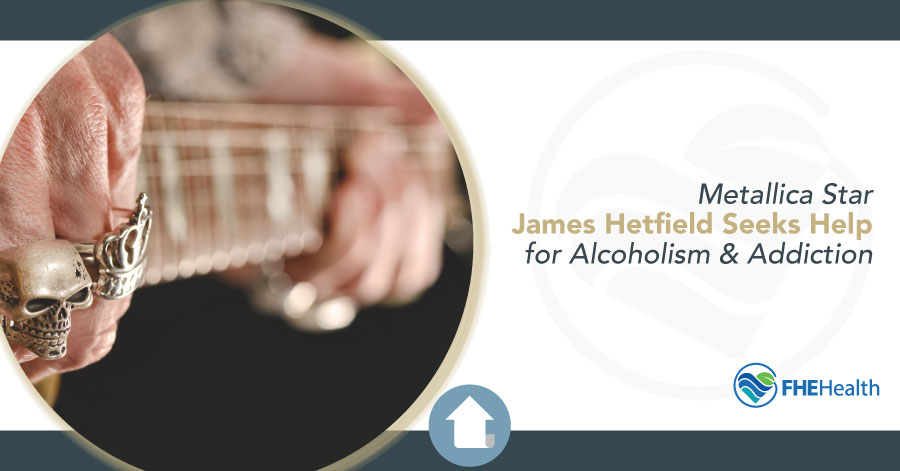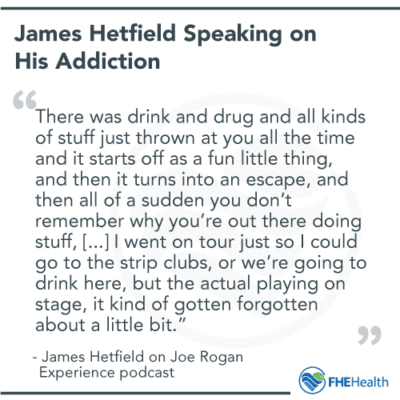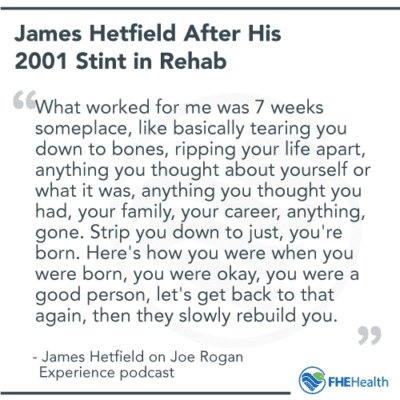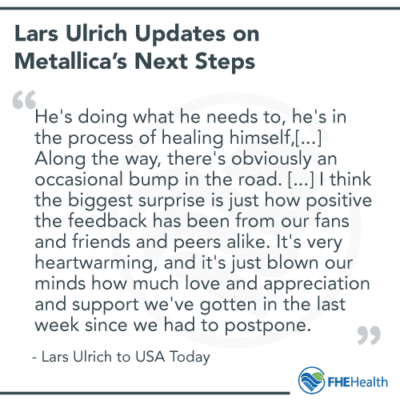
Updated April 7, 2020
Co-founder and lead vocalist of the rock band Metallica, James Hetfield has long had a reputation for hard living– and hard drinking. In the band’s early days, its members all drank heavily, prompting many to refer to the band as “Alcoholica.” As Metallica’s members aged, they all began to slow their consumption of booze– but not Hetfield. From Metallica Albums Kill ‘Em All through Load, Reload, and S&M his drinking continued. In 2001, his wife kicked him out of their home. It was at that point that Hetfield realized that if he didn’t seek help, he risked losing what was most important to him: his family. Hetfield entered rehab and emerged committed to sobriety. While he remained clean for many years, releasing St. Anger, Death Magnetic and Hardwired… to Self-Destruct with Metallica, he relapsed (as so many people suffering from alcoholism do). In September 2019 he once again entered rehab for treatment, and the band has canceled its upcoming tour in Australia and New Zealand as the frontman recovers.
Start Treatment Now
Treatment can begin quickly and discretely, get started now
Hetfield’s History of Drinking
 Many musicians have struggled with drugs and alcohol, but when addiction sets in, few can manage it without treatment. Hetfield endured a traumatic childhood. His father, a truck driver, left, and his parents divorced. His mother, a strict Christian Scientist, died of cancer when Hetfield was 16, after refusing treatment for religious reasons. Hetfield has acknowledged that the darkness of those days has informed his music– and his drinking.
Many musicians have struggled with drugs and alcohol, but when addiction sets in, few can manage it without treatment. Hetfield endured a traumatic childhood. His father, a truck driver, left, and his parents divorced. His mother, a strict Christian Scientist, died of cancer when Hetfield was 16, after refusing treatment for religious reasons. Hetfield has acknowledged that the darkness of those days has informed his music– and his drinking.
For the frontman and main songwriter of one of rock’s most successful bands, alcohol flowed like water wherever he and his band went. Hetfield has recounted that in Metallica’s early days, members often took to the stage drunk. He said, “There was drink and drug and all kinds of stuff just thrown at you all the time and it starts off as a fun little thing, and then it turns into an escape, and then all of a sudden you don’t remember why you’re out there doing stuff.” Hetfield revealed that he did not use drugs like heroin, but only felt drawn to alcohol. Fellow bandmate Lars Ulrich struggled with cocaine, but as other band members slowed their alcohol consumption over the years, Hetfield could not.
“You wouldn’t really like me if you knew my story— if you knew what horrible things I’ve done,” Hetfield stated in an interview. He has elaborated about how touring with the band and his drinking lifestyle was in stark contrast with his life at home. But eventually, his drinking took a toll on his home life and family. Hetfield was once quoted: “Hey, my baby fetches me beers and she’s only four months old … yeah, I’m a proud dad.”
Start Treatment Now
Treatment can begin quickly and discretely, get started now
Hetfield’s Struggle with Mental Health
Hetfield has opened up about his struggles with mental health and alcoholism. He released the documentary Some Kind of Monster after his 2001-2002 experience in rehab, and he has discussed his feelings about the dark side of fame and his struggles with alcohol in many interviews over the years. For Hetfield, it wasn’t simply the partying lifestyle that attracted him to alcohol. It was fear.
Hetfield has acknowledged that he has struggled with fear throughout his life. In fact, some of Metallica’s biggest songs embody this profound sense of fear. For instance, the lyrics to “Enter Sandman” read:
“Sleep with one eye open
Gripping your pillow tight
Exit light
Enter night
Take my hand
We’re off to never-never land”
 The song captures a child’s powerful, all-consuming bedtime fears. As an adult, Hetfield has said that his fear of loss has influenced his drinking. As a teenager who went to live with his older brother after his mother died, he suddenly looked around and thought, “Father lost, mother passes away … where did all my stuff go?” Perhaps that’s why when he felt threatened with the loss of his wife and kids, he chose to enter rehab, to seek recovery.
The song captures a child’s powerful, all-consuming bedtime fears. As an adult, Hetfield has said that his fear of loss has influenced his drinking. As a teenager who went to live with his older brother after his mother died, he suddenly looked around and thought, “Father lost, mother passes away … where did all my stuff go?” Perhaps that’s why when he felt threatened with the loss of his wife and kids, he chose to enter rehab, to seek recovery.
Of treatment, Hetfield said this:
“What worked for me was 7 weeks someplace, like basically tearing you down to bones, ripping your life apart, anything you thought about yourself or what it was, anything you thought you had, your family, your career, anything, gone. Strip you down to just, you’re born. Here’s how you were when you were born, you were okay, you were a good person, let’s get back to that again, then they slowly rebuild you.”
Start Treatment Now
Treatment can begin quickly and discretely, get started now
How Recovery Is a Lifestyle— That Sometimes Involves Relapse
Between 40 to 60 percent of people who’ve been treated for addiction or alcoholism relapse. Relapse can be a disheartening event for individuals, families, and even colleagues and friends. However, it’s important for everyone involved to remember that many serious illnesses are associated with relapse. When a person experiences remission from cancer after treatment but then experiences additional cancer growth years later, they are said to suffer relapse– and, they return to treatment. Alcoholism and drug addiction often involve relapse too. When relapse occurs, it does not indicate that treatment has failed or that treatment can’t work: it only means that more treatment is needed.
 Hetfield achieved sobriety for more than a decade, so his relapse was somewhat unique– though certainly not rare. Most alcoholics will relapse within a year of treatment. But Hetfield’s struggle with alcoholism illustrates that addiction is a lifelong condition. There is no cure for substance addiction. Those who suffer are either able to manage the condition successfully or not. Hetfield successfully maintained sobriety for many years until he couldn’t. Yet, rather than continue the cycle of alcohol abuse, he has once again sought out help by returning to rehab.
Hetfield achieved sobriety for more than a decade, so his relapse was somewhat unique– though certainly not rare. Most alcoholics will relapse within a year of treatment. But Hetfield’s struggle with alcoholism illustrates that addiction is a lifelong condition. There is no cure for substance addiction. Those who suffer are either able to manage the condition successfully or not. Hetfield successfully maintained sobriety for many years until he couldn’t. Yet, rather than continue the cycle of alcohol abuse, he has once again sought out help by returning to rehab.
During his years of sobriety, Hetfield turned to things he was passionate about– his music, of course. He has stated that he enjoys hunting and building custom cars. More than anything, however, it has been his family that has been the primary motivator for the rock star’s quest to stay sober. Fans may well ask, “Why did Hetfield relapse?” There’s no clear answer except that relapse is often part of an addiction diagnosis.
Lead-Up to the Band’s Announcement
Hetfield re-entered rehab in San Francisco this past September. As a result, the band canceled its Australia and New Zealand tour. Ticket holders were refunded and the band issued this statement: “As most of you probably know, our brother James has been struggling with addiction on and off for many years. He has now, unfortunately, had to re-enter a treatment program to work on his recovery again.” Fellow band members expressed their support for Hetfield and told fans they would make their way to that part of the world as soon as their schedule and Hetfield’s health permitted.
In early February James Hetfield sat down for an interview to debut his car collection titled ‘Reclaimed Rust: The Hetfield Collection’. He open about not knowing the next steps for the band, but excited that it was unknown. The WorldWired Tour, which was the series originally cancelled due to Hetfield’s recovery needs now is in limbo due to the Coronavirus pandemic. The rest of the dates through September 2020 appear to be cancelled. The band is slated for several more concerts in South America and the States but those dates have yet to be confirmed since worldwide developments.
Start Treatment Now
Treatment can begin quickly and discretely, get started now
How Hetfield’s Journey to Recovery Is Inspirational
Over the years, Hetfield has been very vocal about his struggles with alcoholism and his mental health. He isn’t alone, of course; in the U.S., more than 14 million adults suffer from an alcohol use disorder, according to the National Institute of Alcohol and Alcohol Abuse. Unfortunately, music fans know that alcoholism and substance addiction don’t always end with recovery. Beloved stars like Amy Winehouse, Elvis Presley, Michael Jackson, and others were plagued by battles with addiction.
Hetfield’s return to rehab is inspirational because it reminds those who suffer not to give up. Sometimes further treatment is necessary– even if it means putting important aspects of your life on hold. Alcoholism is a serious disease and addiction sufferers should never put their treatment needs on hold. Even with his fame and wealth, Hetfield demonstrates how difficult it can be to battle this condition.
And rockstars aren’t the only victims of alcoholism. This condition affects doctors, police officers, business executives, teachers, students, and more. It affects teens, the elderly, and every age demographic in between. If you are struggling to stop drinking or using drugs, you may be suffering from a substance use disorder. Don’t wait to get help. Treatment can help you achieve recovery. As Hetfield once said, “my lifestyle determines my deathstyle.” Having returned to treatment, it’s clear that Hetfield remains committed to beating his “demons” and returning to a life free from alcohol’s dark grasp.
About Kristina Robb-Dover
Kristina Robb-Dover is a content manager and writer with extensive editing and writing experience... read more
Footer
Functional Always active
Preferences
Statistics
Marketing
The FHE Health team is committed to providing accurate information that adheres to the highest standards of writing. If one of our articles is marked with a ‘reviewed for accuracy and expertise’ badge, it indicates that one or more members of our team of doctors and clinicians have reviewed the article further to ensure accuracy. This is part of our ongoing commitment to ensure FHE Health is trusted as a leader in mental health and addiction care.
If there are any concerns about content we have published, please reach out to us at marketing@fhehealth.com.









